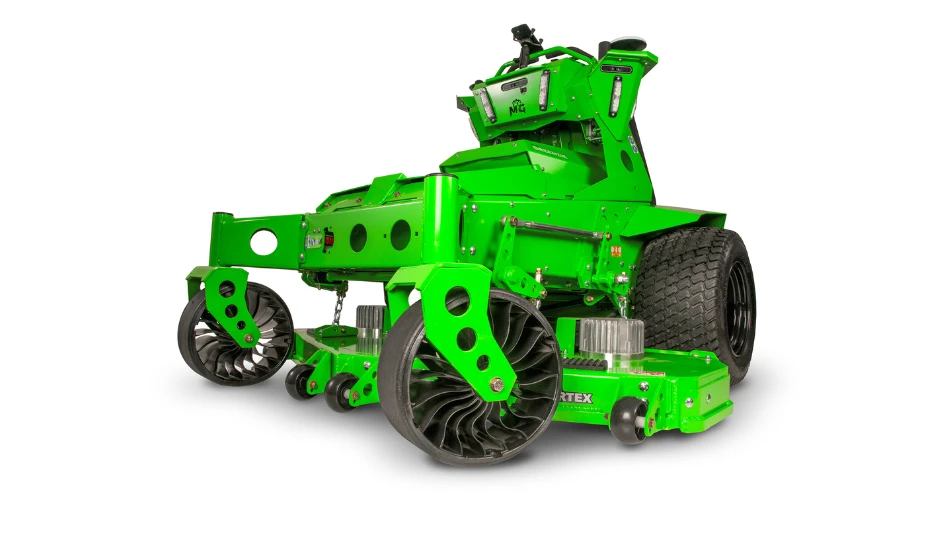Charlie Harrigan has a lot of pride in the fact that he keeps his irrigation inventory in two immaculately neat storage buildings.
"We don’t keep our products in trucks," explained Harrigan, president, Automatic Rain Lawn Sprinklers, Bryantown, Md. "We stock everything in an orderly fashion in our two storage areas. Everything, from heads to controllers, is stacked at a visible level so we can see when we’re running low on a certain product. If I know we have eight jobs coming up and I can visibly see that I only have three controllers left, then I know it’s time to order more."
Most contractors like Harrigan credit good organization and well-kept inventory as the easiest ways to manage the purchasing of irrigation products. But those qualities aren’t the only way to save time, hassle and money when buying heads, controllers, valves, valve boxes, wire, pipe, pipe fittings and other irrigation elements. Buying products at the right time, being aware of inventory risks and how the time spent buying products should be calculated into a customer’s job cost, in addition to product pricing and reliability, are some of the most important factors when it comes to investing a landscape or irrigation company’s dollars into irrigation products.
RELIABILITY IS NO. 1. Contractors don’t want to be anybody’s test market guinea pigs when purchasing irrigation products, according to Brian Day, marketing manager, Century Rain Aid, Madison Heights, Mich., which is why contractors focus on reliability and availability as the No. 1 factor in their irrigation product purchasing decisions.
"Our reputation as a company is built on a durable, long-lasting irrigation system," said Harrigan. "We get our product information from magazine advertising and directly from the manufacturer. We also get information on new products by going to irrigation and lawn shows. We talk to the manufacturers and, if they have a new product, they give us samples to try. But if what we’re already using works and has kept up with our reliable customer image, we don’t switch products."
Another factor that influences contrac-tors’ product purchasing decision is the relationship they have with their suppliers and what type of service the supplier provides. Services, such as delivery, a large inventory, design service, lead generation, on-site job assistance, technical training and provision of sales tools, are added benefits and cannot only stretch out the money a contractor is spending, but also enhance the relationship between a supplier and contractor, commented Jeff Carowitz, vice president – marketing, Hunter Industries, San Diego, Calif.
Distributor service is the No. 1 product purchasing influence for Jim Baker, owner, First Green Lawns, Lafayette, Colo.
"Our distributor is a better inventory manager than we are so they do our cycle count for us and we purchase what they say we need," Baker enthused. "It’s an added service that not only helps us out but builds trust between us and our distributor."
By standardizing his inventory, Gary Schepers, president, Schepers Lawn Sprinkling, Grand Rapids, Mich., said he builds a better contractor-distributor relationship, and ordering products from one or two manufacturers vs. four or five manufacturers makes purchasing irrigation products easier.
The service a distributor provides is important because a great deal on a product doesn’t add up to much when the supplier doesn’t follow through with added and reliable service, Day added.
"If a supplier shows up four hours late to the job site with your products, what is your cost now of that great deal you were supposed to be getting?" Day asked. "Product price, quality and reliability are only small factors in the product purchasing decision when compared to supplier relationship, reliability and performance. How well can your supplier support and back you up if something goes wrong to make sure you’re covered? Overall cost of a product in the long run is less expensive once a relationship has developed and deepened between a contractor and supplier because there are more valuable services being provided."
BLUE LIGHT SPECIALS. Discounts and special sales for buying products in bulk are tempting to a contractor shopping for irrigation products. One example of a money-saving distributor special is something known as the cash discount advantage, Day said.
"The cash discount advantage means ordering a certain number of products and then getting a discount for making a payment in cash by a certain date," Day explained. "Contractors usually enjoy taking advantage of these types of discounts. "
Although some contractors buy as much as they can of a certain product when there is a sale going on, impulse shopping can be dangerous, according to Day.
"What if a contractor decides to load up on a product and suddenly there is employee shrinkage, a fire or a break in?" questioned Day. "Another example is if a contractor takes on a bunch of inventory and then it rains for two or three weeks in a row. Contractors can’t make money by tying up inventory space with products sitting in a corner. Material costs are not the biggest cost a landscape company encounters. What if the weather and economy turn on you at the same time? Products in a warehouse won’t pay anyone’s salary. You can’t take sprinklers to the bank."
According to Day, managing products on a just-in-time basis allows contractors to reduce their overall risks. "A contractor truly doesn’t need any products until he or she has a job to use them on," Day said. "Contractors should turn over their inventory as quickly as they’re turning over their jobs. That’s what distributors are for."
Purchasing products on an inventory-need basis varies for contractors based on the size of the company and the number of jobs they have scheduled that week.
Harrigan, Baker and Schepers buy products 15 to 30 days in advance.
"We buy all of our products monthly to replenish our inventory," Schepers said. "We do an inventory check every week and we will buy products occasionally throughout the month if we run out. We only buy products job-by-job if we are working on a larger project. The advantage to buying products one month in advance is a time savings because we don’t have to go back and forth to our distributor for products."
Because Automatic Rain Lawn Sprinklers is located over one hour away from the nearest distributor, Harrigan has to keep his storage areas full.
"Once we get a positive response to a proposal for a job, we order the products we need for that job," Harrigan stated. "We usually take a peak at our inventory and see what we need every two weeks. This saves the distributor from making so many deliveries and sometimes we’ll get a discount for that. If there is a special or coupon offer through a distributor, we’ll order some products in advance and store them if we know we’re going to use them. We’ll order products, such as a booster pump or an extremely large controller, on a job-by-job basis because our jobs don’t require them as often."
Once in awhile, Baker will order certain products, particularly those he is guaranteed to use, such as heads, valves and pipe fittings, 90 days ahead of time, depending on how much of the season is left for his work.
"When we purchase products this far in advance, we often negotiate different payment terms with the distributor, such as breaking up the payment into thirds to hang onto some of that money for other business purposes," Baker explained. "Theft is our primary concern when we order products this early, but our supply is kept under lock and key and is insured for fire."
While most people recommend buying products not too far in advance, Carowitz said there are advantages to planning ahead.
"Having the product on hand can allow the contractor to respond to unexpected changes mid-way through a project," Carowitz said. "Spending one hour to drive to pick up two 50-cent fittings is a waste of a contractor’s valuable time."
Sponsored Content
A Secret Weapon for Growing Your Lawn Care Business
Retargeting ads allow you to re-engage visitors who leave your lawn care website without converting, helping you stay top-of-mind and increase leads. This article explains how retargeting works, why it’s effective, and how to implement it for your business.
Complete Online Marketing SolutionsSponsored Content
A Secret Weapon for Growing Your Lawn Care Business
Retargeting ads allow you to re-engage visitors who leave your lawn care website without converting, helping you stay top-of-mind and increase leads. This article explains how retargeting works, why it’s effective, and how to implement it for your business.
Complete Online Marketing SolutionsWhether a contractor buys irrigation products in advance or on a job-by-job basis for immediate use, Mark Painter, salesman, Toro Irrigation, Riverside, Calif., said in every case, contractors should be able to organize their workload two weeks in advance and order all of the main items for those jobs.
"Unfortunately, most contractors order products day-by-day, wasting precious working hours in supplier shops," Painter lamented. "Many distributors will allow special pricing on large orders that would represent two to three months of main item purchases in the spring. Overall savings can amount to an additional 5 to 15 percent discount and possibly a delayed payment. These types of deals can be beneficial to good money managers who plan ahead."
JOB COST. Some contractors factor the time spent purchasing irrigation products into their job costs.
Schepers and Harrigan spend only one hour per week ordering irrigation products, which is almost too minimal an amount of time to factor into a job’s cost, while Painter said one-third of the overall cost of a job should be attributed to material costs.
"The material cost for irrigation product purchasing is about 30 percent for us, which means if a job was $1,000, $300 of that would be for the project materials," Baker said.
Day and Carowitz said that contractors and their jobs vary so greatly that an average percentage couldn’t even be established as a portion of job cost, but Day recommended an alternative way to make up for some of those costs and grow profit.
"It’s what I call the $250 rule," explained Day. "Every time you’re about to give Mrs. Jones a price for putting in an irrigation system, take a deep breath and add $250 to the price. If you don’t get the job, there’s probably something you didn’t do right in the sales process. Today, people are making a significant investment in irrigation systems. If you can get an extra $250 on just 20 projects this year, that’s an extra $5,000 profit. If you’re scared to ask for $250 more, ask for $25 the first time and add $50 on the next job. Adding just a little bit to your costs can affect your bottom line and will eventually make up for time spent purchasing products."
The author is Assistant Editor of Lawn & Landscape magazine.
Get curated news on YOUR industry.
Enter your email to receive our newsletters.
Explore the November 1999 Issue
Check out more from this issue and find your next story to read.
Latest from Lawn & Landscape
- Connect, Control & Conserve with Horizon Technical Services
- Use Horizon's Parts Hotline
- How I built a Top 100 company
- Horizon’s Exclusive TurfGro Fertilizer
- Grow your business with mosquito control
- LandCare adds 2 branches in SoCal, promotes Aleman to branch manager
- Spray them away
- PERC helps debut propane direct-injection fuel system at ACT Expo 2025







